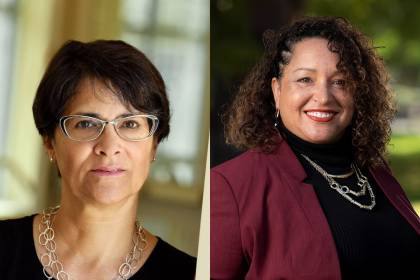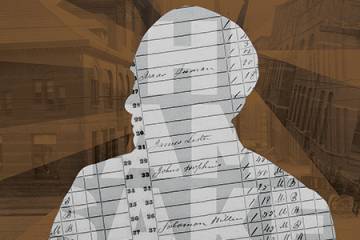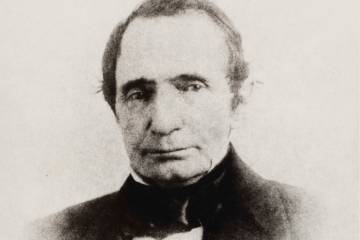Author Jessica Millward believes the work of the historian can bring resolution to decades—and in some cases, centuries—of pain. In her book Finding Charity's Folk: Enslaved and Free Black Women in Maryland, Millward explored history "beyond the archives" to paint a fuller picture of the lives of free and enslaved Black women from Maryland's past, and discovered that it was a pathway to peace.

Image caption: Martha Jones and Jessica Millward engaged in a conversation about Millward's book Finding Charity’s Folk: Enslaved and Free Black Women in Maryland as the opening event in the Hard Histories at Hopkins series on Monday.
"Peace is exactly what, ideally, something like Hard Histories will do," Millward said. "It will resurrect [the memory of people who were enslaved], and in resurrecting their memory and lodging them into the historical record, I also believe that will help their souls find peace."
Monday, Millward engaged in a discussion with history Professor Martha Jones as a part of the book discussion series sponsored by the Hard Histories at Hopkins Project, a university initiative launched in 2020 examining the role that racism and discrimination have played at Johns Hopkins. The book discussion series is hosted by the SNF Agora Institute at Johns Hopkins.
Established in the wake of revelations that university founder Johns Hopkins held slaves, the Hard Histories project blends research, teaching, and public discussions in order to create a repository of scholarly engagement and interpretation while keeping the perspectives of enslaved people at the forefront. The project is conducted out of the SNF Agora Institute.
Millward's book, published in 2015, examines the lives and experiences of Black women—enlsaved and free—in Maryland in the late 18th and early 19th centuries, with a particular focus on Charity Folks, a Maryland enslaved woman who was freed in 1797. Through documents and archives left behind by Folks, Millward utilized nontraditional sources to paint a more complete picture of both Folks herself and life in 18th-century America as a whole.
During the talk, Millward spoke about the mission of the Hard Histories project, and the impact she hopes to see as historians, including Jones, uncover the names and histories of the enslaved men and women who worked for Johns Hopkins and on the Homewood property.
As a legal and cultural historian studying the impacts Black Americans have had on democracy and society, Jones seeks to shed light on contributions of people whom history often overlooks. During the conversation, she spoke about the difficulties of breaking down cultural narratives that have persisted for years.
"One of the number one questions I've been getting of late from young people is a rather pointed one," Jones said. "'Why have you kept this history from us for so long?' And that's a hard question to hear. Because it is a kind of accusation that we've not done our work or haven't done it thoroughly enough so that it's made it into the fabric of everyday lives, including K-12 classrooms."
Millward replied that the time is right to be having these conversations, and that series like this will help these lessons permeate society.
"I end the book by saying any description of enslaved women that forgets hope, faith, and charity has missed part of the story," Millward said. "Understanding how they survived, it sheds a light into how we can really survive in this present moment. In those nuggets of how they survived and negotiated their lives, we can find some kind of inspiration."
The next Hard Histories book talk will take place at noon on March 29. It will feature historian William G. Thomas III, author of A Question of Freedom: The Families Who Challenged Slavery From the Nation's Founding to the Civil War.
Posted in Politics+Society
Tagged slavery









